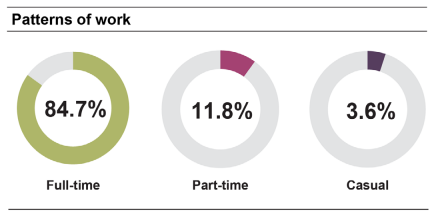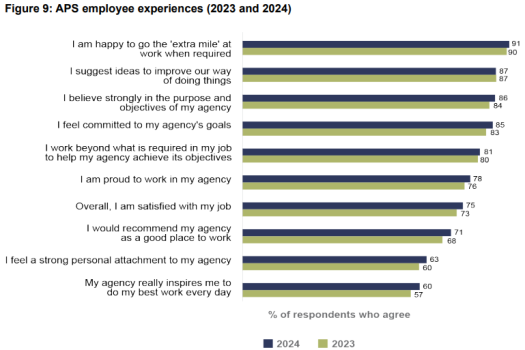Despite its workforce expanding, Australia’s public sector is experiencing an ongoing critical skills shortage.

The State of the Service Report 2023-24 released by the Australian Public Service Commission this week shows the number of APS staff during the period stood at 185,343 across 101 agencies – an 8.9% increase from 30 June.
However, despite the boost in numbers, “APS agencies are reporting critical skills shortages,” says the report.
The APSC flagged the issue last year reporting that 87 agencies had identified a significant increase in critical skills shortages. There was a particular demand for ICT staff, with 76% of agencies struggling to hire the skilled workers they needed to manage growing IT infrastructure.

Community and Public Sector Union national secretary Melissa Donelly told Government News that, “While rebuilding has begun, there are still significant skill gaps right across the APS, with 88% of APS agencies reporting critical skill shortages.”
As well as gaps in ICT, skill shortfalls are also prevalent in project management, leadership, data, and legal.
Donelly told GN that although the APS has begun to address the skills shortage, it needs to do more. “The CPSU has been calling for meaningful career pathways for ICT, data, and legal professionals, including the adoption of common broadbands to allow employees to progress and be remunerated for their skills.”
She added: “This work is critical for attracting and retaining the skills that the APS needs to serve the Australian community.”
Elsewhere, the APS annual report – a collaboration between the APSC and agencies – drilled further into the 2023-24 workforce stats. Among the findings:
- 84.7% of staff were full-time
- 11.8% part-time
- 3.6% casual.

Most APS staff are based in the capital cities – 160,942, or 86.8%. Unsurprisingly, the majority of the workforce – 68,435, or 36% – are based in Canberra.
Just 22,881 (12.3%) are based in regional Australia.
The report also shows only 3.7% of the APS workforce are First Nations employees. As the report’s authors note: “Achieving the Australian Government’s target of 5% for First Nations employment in the APS by 2030 requires a substantial shift in approach.”
They add: “Representation at senior levels is critical to ensure First Nations’ perspectives, knowledge and voices are involved in decision-making processes. This has a positive impact on lifting cultural capability and cultural safety within agencies.”
Other workforce insights show a significant majority of Australia’s public servants are happy with their working conditions, with 82% of workers expressing satisfaction with their non-monetary employment conditions, up 8% from 2023.


“This is the highest level ever recorded for the APS overall,” says APS commissioner Gordon de Brouwer, in the report’s foreword.
The report also finds APS staff engagement at its highest level, with 91% of people responding to the annual employee census willing “to go the extra mile” when required and 87% saying they had a “strong personal connection” to the organisation.
The annual APS round-up also provides an overview of the key outcomes achieved by the public sector during the past year.
Listing some of its major polices and reports delivered during the period, the APS points to:
- the Intergenerational Report 2023-24
- the Future Made in Australia plan, which was funded in the 2024-25 budget
- the report of the Multicultural Framework Review
- APS reform initiatives aimed at rebuilding public trust.
Regarding the latter, de Brouwer was quick to address the APS’ role in the robodebt scandal where 12 public servants – including two former department heads – were found to have breached the code of conduct 97 times during their involvement in the controversial program.
“The APS has faced significant challenges, particularly as we responded to the robodebt royal commission, and we have taken system-wide actions to address them,” said de Brouwer, adding: “The vast majority of public servants perform their jobs capably and with integrity. Reflecting on our recent lessons learnt in the APS will make us firmer in our resolve to do this.”





Leave a Reply